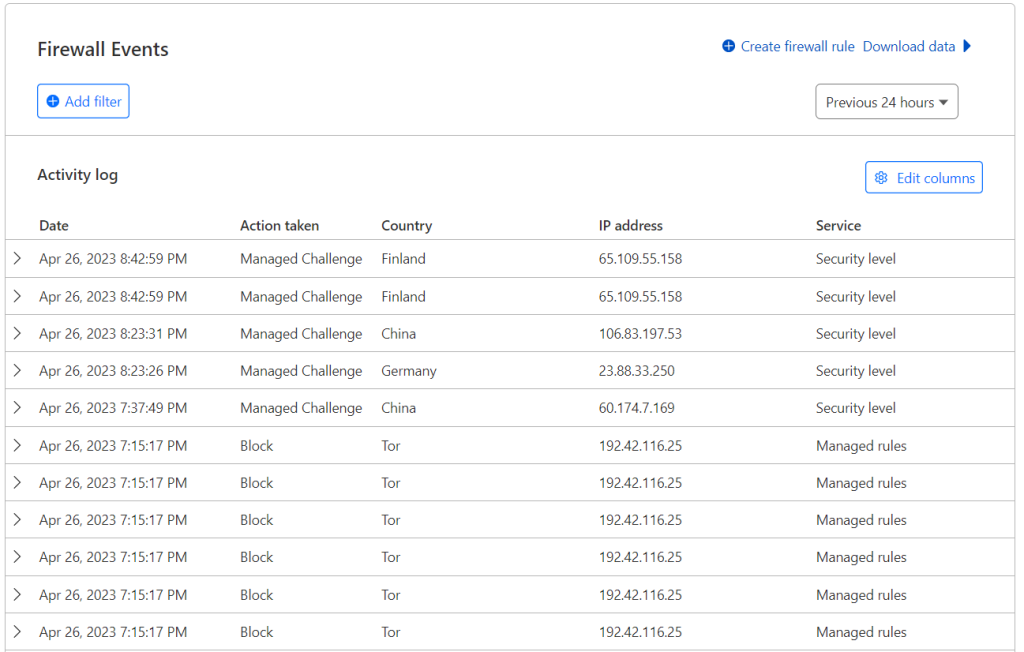
Distributed denial-of-service (DDoS) attacks have become increasingly common in recent years. These attacks can cause significant damage to your website, including downtime, lost revenue, and damage to your reputation. As a website owner, it’s essential to take steps to protect your website from DDoS attacks. In this article, we’ll explore how Cloudflare can help protect your website from DDoS attacks.
What is a DDoS Attack?
A DDoS attack is a type of cyber attack where multiple compromised systems, often controlled by a single entity, are used to flood a website with traffic. The goal of a DDoS attack is to overwhelm the website’s servers, causing it to become unavailable to legitimate users.
There are several types of DDoS attacks, including volumetric attacks, protocol attacks, and application layer attacks. Volumetric attacks are the most common and involve flooding the website’s servers with a large volume of traffic. Protocol attacks involve exploiting weaknesses in the network protocols used by the website. Application layer attacks target the web application itself, overwhelming it with requests and rendering it unavailable.
How Cloudflare Protects Against DDoS Attacks
Cloudflare is a content delivery network (CDN) that provides a suite of security features designed to protect your website from DDoS attacks. Here are some of the ways Cloudflare can help protect your website:
- DDoS protection at the network layer
Cloudflare is a leading provider of DDoS protection at the network layer, offering a range of services to help organizations defend against DDoS attacks. Cloudflare’s network layer protection leverages its vast global network of servers, which can quickly absorb and filter out malicious traffic, keeping websites and applications online and accessible. Additionally, Cloudflare’s DDoS protection can automatically mitigate attacks in real-time, providing organizations with a highly effective defense against the constantly evolving DDoS threat landscape.
One of the key benefits of Cloudflare’s DDoS protection at the network layer is its ability to provide comprehensive protection against various types of attacks. Cloudflare’s advanced security solutions can detect and block various types of DDoS attacks, including application layer attacks, protocol attacks, and volumetric attacks. Cloudflare also provides granular control over traffic filtering, allowing organizations to customize their protection to meet their specific needs.
Another advantage of Cloudflare’s DDoS protection at the network layer is its scalability. Cloudflare’s global network of servers can quickly absorb and filter out large-scale attacks, ensuring that websites and applications remain available and responsive even under high traffic volumes. Additionally, Cloudflare’s DDoS protection can be easily scaled up or down to meet the needs of organizations of any size, making it a cost-effective solution for businesses with varying traffic patterns.
- DDoS protection at the application layer
Cloudflare also offers DDoS protection at the application layer, which is designed to defend against sophisticated attacks that target specific vulnerabilities in web applications. These types of attacks, commonly known as Layer 7 attacks, can be more difficult to detect and mitigate than traditional volumetric DDoS attacks. Cloudflare’s application layer protection uses a range of techniques, such as behavioral analysis and signature-based detection, to identify and block malicious traffic before it reaches the web application.
One of the key benefits of Cloudflare’s DDoS protection at the application layer is its ability to provide granular protection against specific threats. Cloudflare’s security solutions are designed to protect against a range of threats, such as SQL injection, cross-site scripting (XSS), and other application layer vulnerabilities. Cloudflare’s security experts continuously monitor the threat landscape and update their security solutions accordingly, ensuring that organizations are protected against the latest threats.
Another advantage of Cloudflare’s application layer protection is its ability to provide continuous monitoring and analysis of web application traffic. By analyzing web application traffic in real-time, Cloudflare’s security solutions can detect and block potential attacks before they cause damage. Additionally, Cloudflare’s application layer protection can provide insights into web application performance, allowing organizations to identify and address performance issues that may impact user experience.
- Load balancing
Cloudflare load balancing offers DDoS protection by providing a layer of protection against malicious traffic that can overwhelm web applications. Cloudflare’s load balancing service distributes traffic across multiple servers or data centers, ensuring that requests are handled efficiently and that no single server is overloaded. By distributing traffic across multiple servers, Cloudflare’s load balancing can help absorb and mitigate the effects of DDoS attacks, which typically target a single server.
One of the key ways that Cloudflare load balancing offers DDoS protection is through its ability to provide traffic shaping and rate limiting. By shaping traffic and limiting the number of requests per second, Cloudflare’s load balancing can help prevent attackers from overwhelming web applications with traffic. Additionally, Cloudflare’s load balancing can be configured to detect and block traffic from known malicious IPs, further reducing the risk of DDoS attacks.
Another advantage of Cloudflare’s load balancing in terms of DDoS protection is its ability to provide real-time monitoring and analysis of web traffic. By monitoring traffic in real-time, Cloudflare’s load balancing can detect and mitigate DDoS attacks as they occur, helping to ensure that web applications remain available and responsive. Additionally, Cloudflare’s load balancing can provide detailed analytics and reporting on traffic patterns and potential threats, allowing organizations to identify and address potential vulnerabilities proactively.
- Anycast network
Cloudflare’s Anycast network is a powerful tool for protecting against DDoS attacks by providing a highly distributed and resilient network architecture. Anycast is a networking technique that allows multiple servers to share the same IP address, enabling traffic to be routed to the closest server based on network topology. By leveraging Anycast, Cloudflare’s network can distribute traffic across a global network of servers, ensuring that web applications remain available and responsive even in the face of large-scale DDoS attacks.
One of the key advantages of Cloudflare’s Anycast network for DDoS protection is its ability to absorb and mitigate attacks at the edge of the network. By distributing traffic across multiple servers, Cloudflare’s network can absorb and mitigate the effects of DDoS attacks before they reach the origin server, reducing the risk of downtime and data loss. Additionally, Cloudflare’s Anycast network can provide fast failover and automatic traffic routing in the event of an attack, ensuring that web applications remain available even during a DDoS attack.
Another advantage of Cloudflare’s Anycast network is its ability to provide real-time monitoring and analysis of network traffic. By monitoring traffic in real-time, Cloudflare’s network can detect and mitigate DDoS attacks as they occur, helping to ensure that web applications remain available and responsive. Additionally, Cloudflare’s network can provide detailed analytics and reporting on traffic patterns and potential threats, allowing organizations to identify and address potential vulnerabilities proactively.
- Web Application Firewall (WAF)
Cloudflare’s Web Application Firewall (WAF) is a powerful tool for protecting against DDoS attacks by providing a layer of security at the application layer. The WAF sits between the web application and the user, inspecting incoming traffic and filtering out malicious requests. By detecting and blocking malicious traffic, the WAF can help prevent DDoS attacks from overwhelming web applications and causing downtime.
One of the key advantages of Cloudflare’s WAF for DDoS protection is its ability to detect and block traffic from known malicious IPs and networks. By maintaining a constantly updated database of known threats, Cloudflare’s WAF can quickly identify and block malicious traffic, reducing the risk of DDoS attacks. Additionally, the WAF can be configured to detect and block traffic based on user-defined rules and policies, providing fine-grained control over web application security.
Another advantage of Cloudflare’s WAF is its ability to provide real-time monitoring and analysis of web traffic. By monitoring traffic in real-time, the WAF can detect and mitigate DDoS attacks as they occur, helping to ensure that web applications remain available and responsive. Additionally, the WAF can provide detailed analytics and reporting on traffic patterns and potential threats, allowing organizations to identify and address potential vulnerabilities proactively.

- DNS protection
Cloudflare DNS protection offers powerful DDoS protection by using a global anycast network to distribute and filter DNS queries. By leveraging this architecture, Cloudflare can filter out malicious DNS traffic before it even reaches the customer’s infrastructure. DNS DDoS attacks aim to flood DNS servers with massive amounts of traffic, making them unavailable to users. Cloudflare’s DNS protection can mitigate these attacks by filtering out malicious traffic and distributing the remaining traffic across its network of servers, ensuring that legitimate DNS queries are processed quickly and reliably.
One of the key advantages of Cloudflare DNS protection for DDoS protection is its ability to identify and block DNS amplification attacks. DNS amplification attacks are a type of DDoS attack in which an attacker sends a DNS query to a vulnerable DNS server, spoofing the source IP address to make it appear as if the query came from the target. The DNS server then sends a large response to the target, overwhelming its network connection. Cloudflare’s DNS protection can identify and block these attacks by using a combination of anomaly detection and rate limiting techniques to filter out malicious traffic.
Another advantage of Cloudflare DNS protection is its ability to provide real-time monitoring and analysis of DNS traffic. By monitoring traffic in real-time, Cloudflare’s DNS protection can detect and mitigate DDoS attacks as they occur, helping to ensure that DNS services remain available and responsive. Additionally, the DNS protection can provide detailed analytics and reporting on traffic patterns and potential threats, allowing organizations to identify and address potential vulnerabilities proactively.
Conclusion
Protecting your website from DDoS attacks is essential for ensuring its availability and security. Cloudflare provides a suite of security features designed to protect your website from DDoS attacks, including network-level and application-level protection, load balancing, anycast network, WAF, and DNS protection. By leveraging these tools, you can help to prevent DDoS attacks from causing damage to your website and your business.